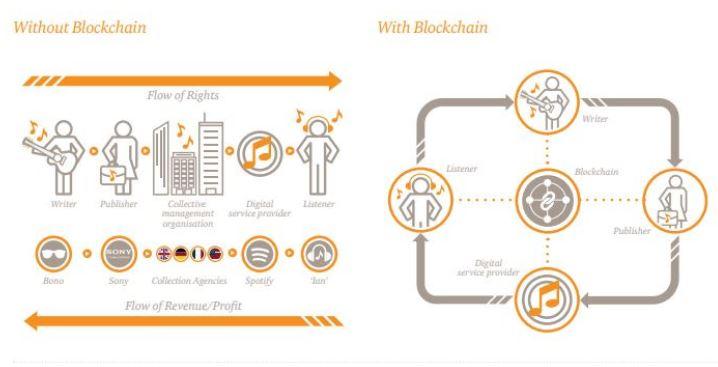Blockchain and the Music Industry

Blockchain is ready for the Music Business.
The "Distributed Ledger" is the database behind the technology called Blockchain and provides greater security of data storage and management.
The data is shared within the network, each participant in this network owns a copy.
Moreover, if someone wanted to modify the data, users would be able to see the changes in real time or at least within a few seconds/minutes. This makes it harder to attack a Blockchain database than a single one, where the data is all in one place. It's also harder to tamper with the network, because Blockchain members would immediately notice a change to a part of the database.
There are many industries that benefit (or would benefit) from this type of data management technology: see the healthcare system, food or goods delivery, and more.
However, let's take a step back and talk about the current system of the Music Industry.
The centralized nature of the complex music system has led to slow or inaccurate royalty payments (non-payments are commonplace).
As a result, there continues to be a disconnect between music rights owners, the artists themselves, and the end consumer.
Not only do artists lose out from this antiquated system; record companies and music publishers, for example, spend significant amounts of money monitoring their artists' rights. Often these artists must wait up to two years after purchasing their work before they are paid.
This leaves the ongoing search for a better system to manage rights and royalty ownership information, as until recently the data was collected and maintained manually, country by country.
A heavy and slow bureaucracy!
Now, however, things could be handled differently with the digitization and use of the Blockchain system.
This technology has the potential to revolutionize the process of managing royalties and rights in the music industry, bringing transparency, trust and streamlined bureaucracy to interactions between companies and corporations (in this case between record labels, artists, publishers, composers, managers).
This could potentially save the music industry billions in lost revenue, late payments and legal fees.
The use of this technology brings transparency and trust to the forefront by providing a means to independently monitor, view and validate transactions in real (or near real) time, so trust is not simply established, but assured.
How, however, can this technology play a key role in making entitlements and payments work fairly and efficiently ?The Blockchain system is the answer.
Any transaction within the Blockchain is encrypted (secure, inviolable and transparent) and with this unique and unmodifiable writing system it could make up for the problem.
Within the Blockchain could be contained the sensitive information of an artist or a song.
Only those who have the key can prove that they are, for example, the author of the song or the artist who performed it. This should make life easier for artists and the companies that collect rights for them from the distribution of music or songs, with real-time updates.
In recent years the word transparency has become fundamental for artists, especially those who have chosen to abandon the majors.
With the block system, one could imagine a portal capable of automatically updating an artist's revenue stream.
Imagine that an artist needs to receive money from a record company.
His rights and royalties could also be recorded immediately in the network, as well as record contracts.
Every time a modification is made, a copy of it is sent to every node on the Blockchain network. An algorithm periodically scans the Ledger and verifies that they all contain the same set of information.

With this system, you could pay an artist or label easily, interact much more conveniently, and remunerateartistsquickly. You could also keep track of all the money.
This system is completely transparent and could bring enormous benefits to the Music Industry.
For this to happen though, the industry must come together to determine a standard practice and the technology!